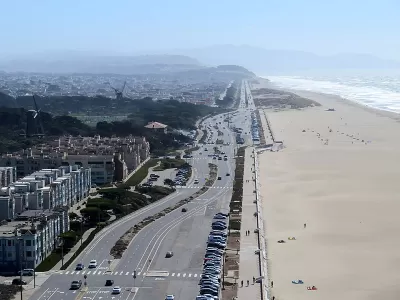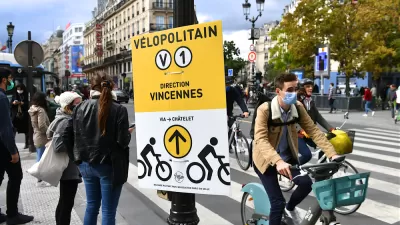Although the project has been hugely successful with local residents, the mayor and some county supervisors wanted to revert the road to vehicle use.

The "Great Walkway," a "pedestrian paradise" created in San Francisco during the pandemic, reopened to cars on August 16. An article written by Heather Knight describes the former 17-acre park, converted to a car-free promenade in April 2020, as "one of the few silver linings to emerge from the COVID-19 pandemic." Since then, "[a] city study found it was incredibly popular — drawing 126,000 visitors each month, including 3,240 each weekday," and 53% of respondents to a survey wanted the change to remain permanent. "The city also rightly responded to neighbors’ concerns about increased traffic on their streets, installing stop signs, speed humps and traffic diverters" on adjacent roads.
Now, in a surprise move that angered mobility advocates, the city's mayor and three county supervisors have "privately decided" to reopen the Great Highway to cars five days a week, citing concerns about access to schools. But "[i]n a city that has 1,200 miles of roads for cars, devoting a small fraction to pedestrians and bicyclists isn’t too much to ask," argues Knight. "If giving 2 miles of the Great Highway to people two days a week is a compromise, as the mayor says, that’s a strange definition."
Before the reopening, close to 600 residents gathered to protest the reopening of the street. The San Francisco Bicycle Coalition said in a statement that the organization "continues to firmly believe that the Great Highway should be a park and be car-free 24/7." Meanwhile, "three city residents on Tuesday planned to file a California Environmental Quality Act appeal in an attempt to block the return of the roadway to vehicles," arguing that putting cars–along with their polluting emissions–back on the street merits an environmental review.
FULL STORY: Sadly, S.F. getting ready to reopen Great Highway - a pedestrian 'paradise' during pandemic

Planetizen Federal Action Tracker
A weekly monitor of how Trump’s orders and actions are impacting planners and planning in America.

Maui's Vacation Rental Debate Turns Ugly
Verbal attacks, misinformation campaigns and fistfights plague a high-stakes debate to convert thousands of vacation rentals into long-term housing.

San Francisco Suspends Traffic Calming Amidst Record Deaths
Citing “a challenging fiscal landscape,” the city will cease the program on the heels of 42 traffic deaths, including 24 pedestrians.

Defunct Pittsburgh Power Plant to Become Residential Tower
A decommissioned steam heat plant will be redeveloped into almost 100 affordable housing units.

Trump Prompts Restructuring of Transportation Research Board in “Unprecedented Overreach”
The TRB has eliminated more than half of its committees including those focused on climate, equity, and cities.

Amtrak Rolls Out New Orleans to Alabama “Mardi Gras” Train
The new service will operate morning and evening departures between Mobile and New Orleans.
Urban Design for Planners 1: Software Tools
This six-course series explores essential urban design concepts using open source software and equips planners with the tools they need to participate fully in the urban design process.
Planning for Universal Design
Learn the tools for implementing Universal Design in planning regulations.
Heyer Gruel & Associates PA
JM Goldson LLC
Custer County Colorado
City of Camden Redevelopment Agency
City of Astoria
Transportation Research & Education Center (TREC) at Portland State University
Jefferson Parish Government
Camden Redevelopment Agency
City of Claremont





























